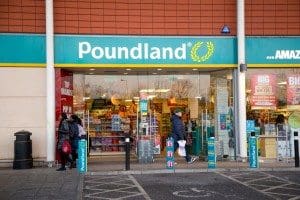Poundland has announced a sweeping restructuring plan that will see it close 68 stores, end online sales, and shut down two distribution centres, in a move that places more than 2,000 jobs at risk and raises questions over the future of the high street discounter.
The announcement follows the sale of the company last week to US investment group Gordon Brothers for just £1, a sign of the pressure the business has been under amid tough trading conditions. Poundland, which currently operates more than 800 outlets across the UK and Republic of Ireland, said it plans to shrink its estate to no more than 650 stores in the long term.
The closures form part of a broader restructuring strategy aimed at returning the business to profitability, following a period of sustained underperformance and what it described as “challenging” trading in clothing and homeware.
As part of the process, Poundland is also seeking aggressive rent reductions from landlords, requesting zero rent on up to 180 stores and proposing cuts of 15% to 75% on dozens more. The plan will be put to creditors in August as part of a court-sanctioned procedure, which applies to UK operations only. The retailer’s stores in the Republic of Ireland and Isle of Man, where it trades as Dealz, are unaffected.
In a significant strategic shift, Poundland is abandoning online sales entirely and scrapping its Perks loyalty app. It will also exit the frozen food category and reduce its chilled offering to a limited range of essentials, including milk and items that form part of its £3 meal deals, such as sandwiches.
These changes will result in the closure of the chain’s frozen and digital distribution centre in Darton, South Yorkshire later this year and its national distribution centre at Springvale in Bilston, West Midlands by early 2026. Poundland said it would continue to operate its other distribution centres in Wigan and Harlow.
The scaling back of the business reflects not only changing consumer behaviour but also rising operating costs and a need to focus on core product categories and profitable locations.
Founded in 1990 with a single store in Burton upon Trent, Poundland grew to become one of the UK’s most recognisable high street brands, offering value products at fixed low prices. In recent years, it has expanded into fashion and homeware and introduced more flexible pricing and frozen food ranges in a bid to modernise its appeal.
However, under the ownership of Pepco Group, which put the company up for sale in March, the business struggled to maintain margins and suffered from poor performance in non-food categories.
The £1 sale to Gordon Brothers, best known in the UK for its previous ownership of Laura Ashley, reflects the level of distress within the business. The US firm has said it will invest up to £80 million in Poundland to support the turnaround plan.
Barry Williams, managing director of Poundland, acknowledged the gravity of the situation: “It’s no secret that we have much work to do to get Poundland back on track. While Poundland remains a strong brand, serving 20 million-plus shoppers each year, our performance for a significant period has fallen short of our high standards and action is needed to enable the business to return to growth.”
“It’s sincerely regrettable that this plan includes the closure of stores and distribution centres, but it’s necessary if we’re to achieve our goal of securing the future of thousands of jobs and hundreds of stores.”
The restructuring will bring inevitable concern for the chain’s workforce. Poundland currently employs around 16,000 people, meaning more than one in eight roles could be at risk if all proposed closures and job cuts go ahead.
The situation at Poundland highlights the continued volatility in UK retail, especially among value-focused brands that face pressure from both ends: squeezed consumer spending and rising operational costs.
Analysts say the decision to exit online sales, frozen food, and unprofitable stores reflects a wider trend among struggling retailers to simplify operations and return to basics. However, the sheer scale of the cutbacks will make this one of the most significant high street restructurings of the year.
While Gordon Brothers’ investment gives Poundland a financial lifeline, the success of the turnaround will depend on its ability to retain customer loyalty, streamline operations, and adapt to a rapidly shifting retail landscape. The outcome of its August restructuring vote will also determine how many stores—and how many jobs—can ultimately be saved.
Read more:
Poundland to shut 68 stores in restructuring that puts 2,000 jobs at risk











